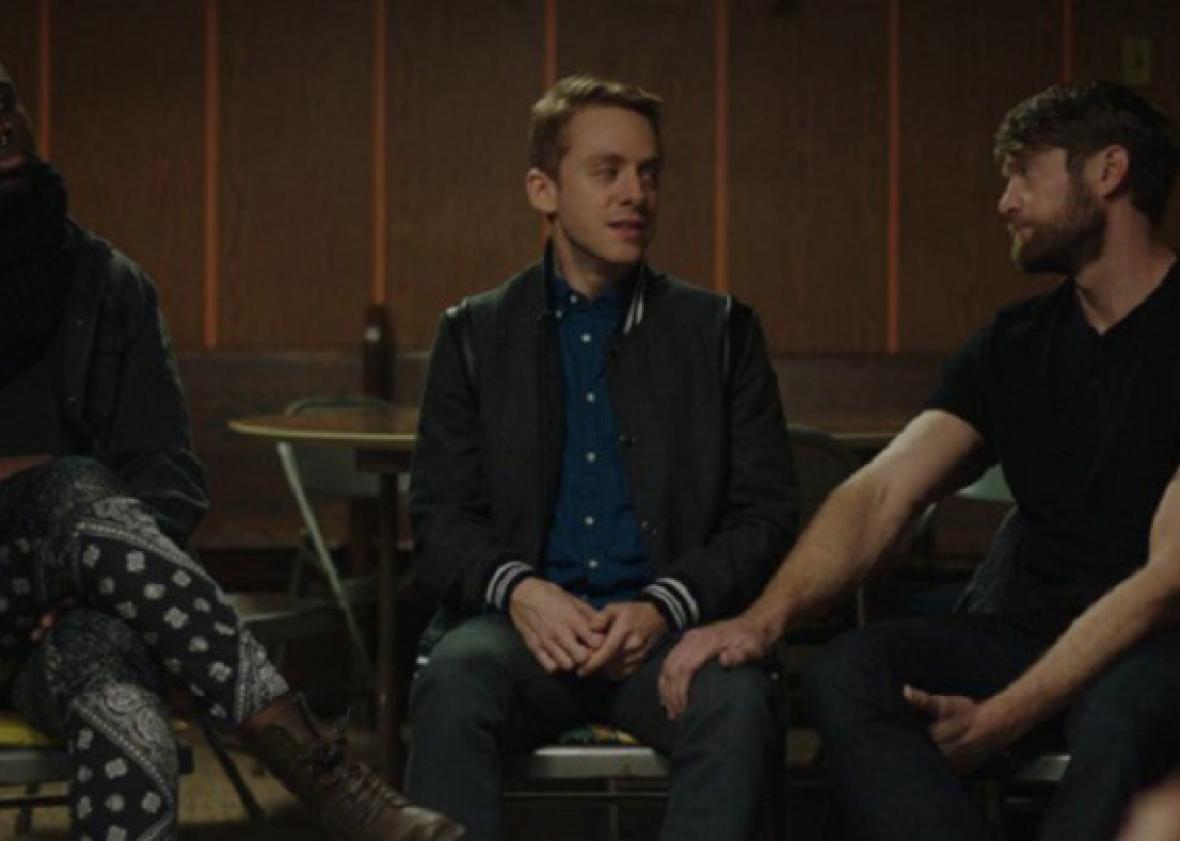“Olivia,” the fifth webisode of High Maintenance, introduces Max (Max Jenkins), a gay twentysomething “wasting away in retail,” and his roommate and best friend, Lainey (Heléne Yorke). They’re as inseparable as they are insufferable, sassing their way through a trendy Brooklyn lifestyle, their insularity rendering virtually anyone who enters their orbit “literally the worst.” For them, nastiness is comfort, apathy the standard. They come off like snobby, self-interested millennials, of a stripe quite common among generational caricatures. Even their pot dealer—better known as the Guy (Ben Sinclair), High Maintenance’s central character—has them listed in his phone contacts under “assholes,” and groans at the mere thought of his next encounter with them.
High Maintenance—which began in 2012 as a DIY project created by Sinclair and his wife Katja Blichfeld and is now a top-notch HBO series—has made an art form out of building up stereotypes before upending them. A seemingly cookie-cutter, well-to-do couple of young professionals succumbs to apocalyptic paranoia; an award-winning writer and stay-at-home dad is revealed as a closeted cross-dresser; a successful, Tinder-spawned relationship is sabotaged when it’s revealed that one half of the couple is secretly homeless.
But there’s no such twist in “Olivia”—if anything, its final moments endorse the Guy’s curt labeling of Max and Lainey as “assholes” even more. In subsequent online seasons, both characters pop up individually as parts of other characters’ stories, but they are on the fringes, marked by their sass and still without much complexity to mull over. That was: until the HBO episode “Meth(od)” finally challenged our perception of the trope of the “gay best friend.”
At an HBO-friendly 34 minutes, “Meth(od)” essentially tells two High Maintenance stories in one, with the second half of the episode focused on Max and Lainey. It begins with an image of the pair cryptically conversing at a party, shaming those who meet their glance, but swiftly moves into richer territory. Max leaves Lainey for a hookup, and rather than reunite with her after his quick fix (which is filmed as a graphic but sensual full-frontal sequence), he decides to follow his date into an Alcoholics Anonymous meeting—and lie to Lainey about doing so. “I’m an addict, too,” Max tells his date, a line that at first rings hollow, but gradually takes on profound meaning. The unhealthily dependent dynamic between Max and Lainey is suddenly laid bare: how their most intimate moments rely on a certain degree of meanness, how Lainey subtly takes emotional (and financial) advantage of Max, and how their closeness masks deep loneliness and insecurity. Max finds healing in AA, relating to others’ vulnerability and realizing his longing for a more substantive connection. He distances himself from Lainey, almost unwittingly; he balks at her toxicity and runs toward warmer waters. In effect, Act 2 of “Meth(od)” plays like a careful meditation on the gay best friend TV trope. It grants startlingly humane access into a relationship normally depicted in television with mockery, disdain, or both.
It’s particularly powerful that “Meth(od)” offers Lainey equal interiority—her sense of loss is conveyed by casual drop-offs in the tone of her voice, her fleeting facial expressions hinting at inner turmoil. She returns to the only trick she knows in trying to win back her friend: awfulness. She exposes Max’s deceit after secretly following him to AA, forcing him onto a deranged, meth-aided bender. The bond between the two of them is suffused with a very specific, very intense brand of love.
The arc of Max and Lainey—from “Olivia” to “Meth(od)”—is a prime example of exactly what High Maintenance does best: presenting a type you think you recognize and then turning it upside down by offering an uncommonly textured and nuanced perspective. Consider the grimly satisfying end of the episode, as a melancholy Max sits with Lainey on their couch, in reflection. As per usual, she’s the only person there for him—but now, she’s also the person who just intently destroyed his clearest chance at happiness. Max ends up in need of her comfort and is back to quipping for her cackling approval before long. “I’m the luckiest boy in the world,” he says after finally getting a laugh out of her. Lainey proudly agrees. Putting a pin in this High Maintenance saga, it’s a bleakly funny if also coarsely empathetic ending—a coy acknowledgment of a vicious friendship cycle but also an ode to a vibrant, derided, troubled, consuming partnership that few would care to really understand.
